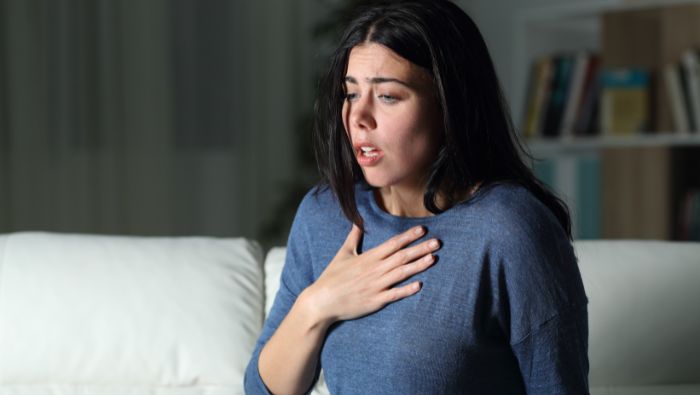What Is The Root Cause Of Depression And Anxiety?
Depression and anxiety can be debilitating illnesses, often leading to a loss of quality of life.
While there is no single cause of depression and anxiety, research has shown that there are several potential root causes.
The most common root causes include genetic factors, chemical imbalances in the brain, and environmental stressors.
These factors can interact with each other and create a complex web of conditions that lead to depression or anxiety.
For example, an individual may have a family history of mental health issues which combined with stressful events could lead to symptoms such as feelings of sadness or worry.
Other biological factors such as hormones or neurotransmitters may also play a role in the development of depression or anxiety.
Low levels of serotonin (a neurotransmitter) have been associated with an increased risk of developing these conditions.
Is Fear The Root Of Anxiety?
Fear is an emotion closely connected to anxiety, and it can be easy to assume that fear is the root of all anxious feelings.
But in reality, there can be many sources of anxiety, including genetics and environmental factors.
It’s important to recognize that fear isn’t the only cause of anxiety and other forms of stress, as understanding the source of your anxiousness may help you find a better way to cope with it.
Anxiety has been linked to fear for centuries, but research has revealed more about its complexity in recent years.
Many people who experience anxiousness don’t even have a clear reason why they feel it — their brains are hardwired differently than those without anxiety.
This suggests that genetics plays an important role in how we experience emotions like fear and nervousness.
Types Of Anxiety
Anxiety is a mental health disorder that affects millions of people worldwide.
It can manifest in many different forms, from mild to severe.
Here, we will look at some of the most common types of anxiety that people experience and how they affect an individual’s life.
The first type of anxiety is Generalized Anxiety Disorder (GAD).
GAD is marked by persistent worry and fear about everyday situations such as work or school performance.
People who suffer from GAD often feel overwhelmed and unable to cope with everyday stressors.
Panic Disorder is another type of anxiety that causes sudden bouts of intense fear or terror.
Those suffering from Panic Disorder may find themselves avoiding certain places or activities due to the recurrent episodes they experience.
Social Anxiety Disorder (SAD) is a third common type of anxiety characterized by excessive self-consciousness in social situations.
People suffering from SAD fear being judged or scrutinized by others and avoid social interactions.
How do you know if your child has an anxiety disorder? Anxiety can be difficult to pinpoint because it can cause a variety of physical, cognitive, and behavioral symptoms.
It is important to remember that anxiety symptoms are usually temporary and are not harmful.
There are a number of symptoms associated with various types of anxiety disorders, but some may be more likely to occur than others.
What Causes Anxiety In The Brain?
Anxiety is a common mental health disorder that affects an estimated 40 million American adults, according to the Anxiety and Depression Association of America.
While anxiety can manifest in many different ways, it all originates in the brain. But what exactly causes anxiety in the brain?
Research has suggested that specific neurotransmitters—namely, serotonin, dopamine, and norepinephrine—are related to levels of anxiety in humans.
Serotonin is responsible for regulating mood and emotions, while dopamine plays a role in reward-driven behavior; both are associated with increased levels of anxiety when not properly regulated by the brain.
Norepinephrine is also thought to be linked to heightened levels of stress hormones like cortisol and adrenaline when released in high amounts.
In addition to these neurotransmitters, research also points toward structural abnormalities within certain areas of the brain being related to increased anxiety symptoms.
What Is The Spiritual Root Of Anxiety?
The spiritual root of anxiety has been debated for centuries and is often overlooked in favor of more traditional medical treatments.
Anxiety can be a debilitating disorder, leaving those affected feeling overwhelmed and unable to cope with everyday life.
Many believe that there are spiritual aspects to anxiety that can be addressed through prayer, meditation, or other forms of spiritual practice.
Holistic healing, mindfulness, and energy work may offer relief from the physical symptoms of anxiety while also addressing its underlying spiritual causes.
In order to address the spiritual root of anxiety, it is important to understand the concept behind it: namely, that our emotions and mental states are interconnected with our spirituality.
This connection works both ways; when we experience strong negative emotions, they may have an impact on our relationship with God or Universe.
The History Of Anxiety
The History Of Anxiety has been a topic of discussion for centuries.
Early records of anxiety can be found as far back as the 4th century BCE in ancient Greece and Rome, where it was referred to by various names such as “phobia” and “panic”.
For thousands of years, religious leaders have tried to explain anxiety through spiritual explanations, interpreting it as punishment from God or a sign of evil forces at work.
In more recent times, anxiety has been studied from a scientific perspective, leading to an improved understanding of its causes and treatments.
In the 19th century, Sigmund Freud developed psychoanalytic theories about the mind and suggested that some forms of anxiety could be caused by unresolved psychological issues.
During the 20th century, behavioral researchers including Joseph Wolpe and John B. Watson expanded our understanding of anxiety.
For example, discovering that exposing high-anxious individuals to anxiety-provoking stimuli could cause a panic attack.
Anxiety disorders are associated with chronic life stress. Unpredictable, unrelenting, unresolvable stressors chronically stimulate the stress hormone system and cardiovascular system and lead to states of constant increased activity.
What Is The Root Cause Of Anxiety Disorder?
Anxiety disorder is a mental health issue that affects millions of people around the globe.
It can have severe and debilitating effects on individuals, affecting their day-to-day lives.
So what is the root cause of anxiety disorder?
At its core, anxiety disorders are caused by an imbalance of hormones in the brain.
This hormone imbalance can be caused by genetics, environmental factors, or both.
Certain types of stress and trauma can also lead to anxiety disorders as well as certain medical conditions such as thyroid problems that alter hormone levels in the body.
It’s important to note that there is no single cause for all types of anxiety disorders but rather a combination of factors may contribute to them such as genetic predisposition, environment, lifestyle, and medical history.
Symptoms Of Anxiety
Anxiety can be difficult to recognize because it often has no obvious physical signs.
Mental health experts identify a few key symptoms that can help to identify if someone is struggling with anxiety.
The two main types of symptoms are psychological and physical. Psychological symptoms may include feelings of fear and worry, difficulty concentrating, or feelings of being overwhelmed.
Physical signs may include an increased heart rate, feeling sick or dizzy, headaches, stomach pains, or muscle tension.
It’s important to note that these symptoms may come and go over time and vary in severity from person to person; however, the intensity level doesn’t necessarily correlate with the amount of anxiety one is experiencing.
If you suspect you or a loved one might be struggling with anxiety it’s best to talk to a mental health professional for proper diagnosis and treatment options.
How Do You Find The Root Of Anxiety?
Finding the root of anxiety can be a difficult process.
Anxiety is a complex emotion that can have multiple causes, and understanding the underlying source of your anxiety can be critical in finding an effective treatment.
Recognizing signs, talking to a trusted confidant, and seeking professional help is essential in determining the root cause of your anxiety.
The first step in identifying the root cause of your anxiety is to recognize its symptoms. It’s important to take note of when it occurs and how long it lasts.
Common signs include feeling overwhelmed or powerless in certain situations, physical symptoms such as heart palpitations or sweating, irritability, or anger outbursts, among others.
Learning to identify these signs will make it easier to spot triggers and determine where they may come from.
How Can Counseling Help Anxiety?
Counseling can be an effective way to help those who are struggling with anxiety.
Anxiety is a condition that affects millions of people around the world and it can take a toll on mental health.
Fortunately, counseling provides individuals with the tools they need to cope with their struggles and lead healthier lives.
Counseling offers a safe space for those who suffer from anxiety to explore their thoughts and feelings without judgment.
A qualified counselor can provide support as well as guidance in order to uncover the root causes of anxiety, as well as develop strategies for managing it effectively.
Through therapy sessions, clients learn relaxation techniques such as deep breathing and mindfulness meditation which can reduce symptoms associated with anxiety such as stress, fear, and panic attacks.
These methods also help build self-esteem by providing an opportunity to challenge negative thought patterns that may have formed over time due to experiences or environment.
Treatment For Anxiety Attacks
Anxiety attacks can be a debilitating and overwhelming experience, but they don’t have to be.
With the right treatment, individuals struggling with anxiety attacks can find relief and learn to manage the intense symptoms that accompany them.
Treatment for anxiety attacks is an effective way for those who suffer from anxiety attacks to minimize their impact and build a more productive life.
Treatment for anxiety attacks often involves cognitive-behavioral therapy (CBT).
CBT works by helping individuals identify triggers that induce negative thoughts or behaviors and teaching them how to address these issues in healthy ways.
The approach also helps individuals build coping skills and create positive behaviors in order to effectively manage their anxiety when it arises.
Additionally, relaxation techniques such as deep breathing exercises, mindfulness meditation, yoga, or progressive muscle relaxation are also useful tools for managing anxiety attack symptoms.
What Therapies Are Good For Anxiety?
The prevalence of anxiety disorders is on the rise, and it’s time to consider treatments.
From talk therapy to lifestyle changes, there are a variety of therapies that can help those who suffer from anxiety.
These different strategies can be used together or separately to find relief.
One type of treatment for anxiety is cognitive-behavioral therapy (CBT).
This form of talk therapy focuses on changing thinking patterns associated with negative emotions and behaviors.
Through CBT, individuals learn how their thoughts affect their feelings and actions, giving them the power to make positive changes in their lives.
Additionally, some medications like antidepressants and anti-anxiety drugs may also be prescribed by a doctor as part of an overall treatment plan for managing anxiety symptoms.
Anxiety Counseling Techniques
Anxiety counseling techniques are essential for those looking to reduce their anxiety and lead a healthier, more fulfilling life.
Sufferers of anxiety often feel overwhelmed and helpless in the face of rising stress levels, but help is available through counseling techniques developed by mental health professionals.
These techniques focus on identifying the thought patterns that underlie anxious feelings, helping victims learn how to better control their reactions and responses.
When beginning an anxiety counseling program, patients should expect to discuss their thoughts and feelings with a counselor in an open, non-judgmental environment.
Goals will be identified which may include methods for coping with intrusive thoughts or strategies for managing stressors such as work or family pressures.
How Long Does Therapy Take For Anxiety?
Anxiety is an incredibly common disorder that affects millions of people every year.
With the help of therapy, individuals can get to the root of their anxiety and begin healing.
But how long does it take for therapy to work for anxiety?
Therapy for anxiety is generally a slow process, as it involves exploring deep-seated feelings and issues.
In most cases, therapy takes several months or even years before individuals start to see results.
For example, cognitive behavioral therapy (CBT) can take up to 20 sessions over multiple weeks in order to begin making a difference in the patient’s life.
During those sessions, both therapist and patient will be actively working towards understanding the causes of their anxiety and how best to manage it.
While there are no guarantees on how long it will take, with dedication and commitment from both parties involved good progress can be made faster than expected.
Therapy Techniques For Anxiety And Depression
Anxiety and depression are two of the most common mental health disorders affecting people around the world.
Both conditions require professional treatment to address symptoms, yet there are also several core techniques that can be used to help manage them on a daily basis.
Cognitive Behavioral Therapy (CBT) is one of the most popular approaches for treating anxiety and depression, as it focuses on recognizing distorted or irrational thinking patterns that lead to feelings of distress and/or hopelessness.
Mindfulness-Based Stress Reduction (MBSR) is another important technique that has been shown to be effective in reducing anxious thoughts while improving overall well-being.
Cognitive Behavior Therapy For Anxiety
Cognitive Behavior Therapy (CBT) is a form of psychotherapy used to treat anxiety.
CBT is based on the idea that our thoughts, feelings, physical sensations, and behaviors are interconnected, and those negative thoughts can lead to anxious feelings and behavior.
By changing how we think about certain situations, we can change how we feel and behave in response to them.
CBT helps people become aware of the distorted thinking patterns that contribute to their anxiety.
Through this awareness, they develop more accurate ways of interpreting situations which leads to less anxious feelings and behavior.
In CBT for anxiety therapy sessions, patients learn techniques such as relaxation exercises aimed at reducing physiological arousal or cognitive techniques such as challenging irrational beliefs or developing more realistic expectations about oneself and others.
Therapy For Anxiety
Anxiety is a mental health condition that can be difficult to live with, but there are ways to manage it and get relief.
Therapy for anxiety is one popular option that can help individuals learn how to cope with their symptoms in a healthier way.
Therapy provides people with the tools they need to understand their anxious thoughts and feelings so they can find relief from them.
Cognitive Behavioral Therapy (CBT) is one of the most well-known types of therapy for anxiety.
This type of psychotherapy helps people change “unhelpful” thought patterns that keep them stuck in an anxious state by teaching them new thought processes.
In CBT, individuals learn new coping strategies that allow them to deal with stress more effectively, reducing their overall level of anxiety.
You may also enjoy…
How To Deal With Rejection At Work [Or, While Job Searching]
Why Does Motivation Come And Go?








